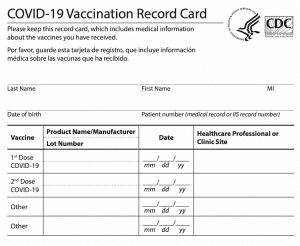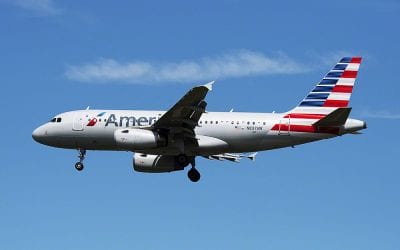After November 7, unvaccinated traveler requirements for COVID-19 testing will be more stringent to be allowed to re-enter the US.

Americans planning international journeys after November 7 or who are already abroad but not returning to the US before November 8, must follow the new rules. Unvaccinated traveler requirements to return home are changing to prevent incurring serious and possibly expensive delays.
Which Americans are considered fully vaccinated?
Americans are considered fully vaccinated 2 weeks after:
• their dose of an accepted single dose COVID-19 vaccine, or
• their second dose of an accepted two dose COVID-19 vaccine, or
• receiving the full series of an active (not placebo) COVID-19 vaccine in a U.S. based trial of the AstraZeneca or Novavax vaccines, or
• receiving two doses of any “mix-and-match” combination of accepted COVID-19 vaccines administered at least 17 days apart.
The U.S. accepts all COVID-19 vaccines approved or authorized by the FDA and WHO.
What vaccines are accepted by the U.S.?
The U.S. accepts all vaccines approved or authorized for use in the U.S. by the Food and Drug Administration (FDA) and vaccines listed for emergency use by the World Health Organization (WHO). Americans vaccinated abroad with accepted vaccines are considered fully vaccinated if they meet the criteria listed above.
What is acceptable proof of COVID-19 vaccinations for Americans?
• A verifiable QR code-based digital COVID-19 vaccination certificate viewable in a smartphone app, such as those issued by the United Kingdom or European Union.
• A non-verifiable printout or paper COVID-19 vaccination certificate issued at the national or subnational level or by an authorized vaccine provider such as the CDC vaccination card.
• A non-verifiable digital photo of a vaccination card or record, downloaded vaccine record or vaccination certificate from an official source or a mobile phone app without a QR code.
Americans can prove they’re fully vaccinated by displaying a readable digital photo of their CDC COVID-19 vaccination certificate on their smartphone.
While Americans traveling abroad will have to be sure their vaccination documentation will be acceptable to the nations they’re visiting, to return home, readable digital photos of their CDC COVID-19 vaccination certificates, stored in their smartphones, will be acceptable proofs of vaccination.
What COVID-19 tests with a negative result are acceptable to the U.S. in order to be cleared to fly home?
In order to return to the U.S. from a foreign nation, unvaccinated traveler requirements will include a COVID viral test such as an antigen or RT-PCR test. Rapid antigen tests made directly by medical personnel or self tests supervised in real-time by medical personnel are acceptable. For example, U.S. travelers may purchase rapid self-test antigen home kits that include a telehealth service that provides supervision remotely through an audio and video Internet connection to the service. By packing one of the home kit test packages with a supervision package, Americans won’t have to find an acceptable location at their final destination to be tested for their return flight.
Bringing a home test kit with a supervision package purchased before your journey home is an easy way to ensure unvaccinated traveler requirements are met.
I recommend home kits with a supervision package. If you’re purchasing a home test kit, purchase at least a two-pack for each person with whom you’re traveling. Sometimes the home kit tests fail, giving no result. In that case, a retest will be required. Hence the second kit. Before purchasing, check the kit’s expiration date to be sure it will be valid when used.
If your test is negative, you’ll get an accepted certificate for your smartphone. In many cases, the result can be uploaded directly to a smartphone airline app. As a backup, locate a COVID-19 test location at your final destination before leaving the U.S. or at your final destination, if possible. Make sure they will use an accepted test method. Tests aren’t required for children under 2 years of age or Americans who have recovered from COVID-19 in the past 90 days before their flight.
Unvaccinated travelers whose flight to the U.S. is delayed to the next day will need to be retested for COVID before they can board their flight.
When do Americans have to be tested prior to their flight back to the U.S.?
If you’re fully vaccinated, you need to be tested within three days of your return to the U.S. Unvaccinated children between 2 and 17 years of age, traveling with fully vaccinated parents or guardians, also may be tested within three days of departure for the U.S.
If you’re not fully vaccinated, you must be tested within one day of your return. Needing to be tested within a day of departure can be a serious problem. If you test positive, you’ll have little time to change your travel plans and arrange for a place to stay in isolation and get meals until you test negative. If you test negative, but your flight is delayed to the next day, you’ll have to quickly arrange to be retested in order to fly home.
What documentation do Americans need to board their flight home?
Americans need a valid passport, acceptable proof of their negative COVID-19 test or proof of recovery and if claiming full vaccination, proof of the same.
To stay safe and make international travel much easier, get fully vaccinated.
I strongly recommend that all international travelers are fully vaccinated for COVID-19. From a practical viewpoint, many more nations are open to vaccinated rather than unvaccinated travelers. It also makes travel logistics easier. More important, while breakthrough cases occur, the vast majority of fully vaccinated people are safe from serious COVID-19 disease, while the unvaccinated will continue to get sick with many dying from COVID infections.
After many years working in corporate America as a chemical engineer, executive and eventually CFO of a multinational manufacturer, Ned founded a tech consulting company and later restarted NSL Photography, his photography business. Before entering the corporate world, Ned worked as a Public Health Engineer for the Philadelphia Department of Public Health. As a well known corporate, travel and wildlife photographer, Ned travels the world writing about travel and photography, as well as running photography workshops, seminars and photowalks. Visit Ned’s Photography Blog and Galleries.



